 >Home>
SEPKU News
>Home>
SEPKU News
On the afternoon of October 18, 2021, the fourth lecture of the the Lecture Series on International Organization and Global Economic Governancewas held in Conference Room 107 at the School of Economics. Leslie Maasdorp, Vice President and Chief Financial Officer of the New Development Bank (NDB), made a presentation entitled "The Role of Finance in the Journey to A Low Carbon Future". This event was jointly organized by the School of Economics at Peking University and the Talents Office of the International Organization of the Peking University Student Employment Guidance Service Center.
Before the lecture, Professor Dong Zhiyong, Assistant to President of Peking University and Dean of the School of Economics, Professor Xuezheng Qin, Assistant Dean, and Associate Professor Wu Zenan, Assistant Dean, held talks with Leslie Maasdorp. Dong Zhiyong expressed his gratitude to Leslie Maasdorp for his support to the academic activities of the School of Economics at Peking University, and welcomed him to communicate with the teachers and students of the School of Economics in the future to deepen the cooperation between institutions. Leslie Maasdorp expressed his thanks for this communication opportunity. He responded that Peking University plays an important role in the field of development finance, and he looks forward to in-depth research cooperation with Peking University in the field of development finance to jointly discuss the future development trend of development finance.
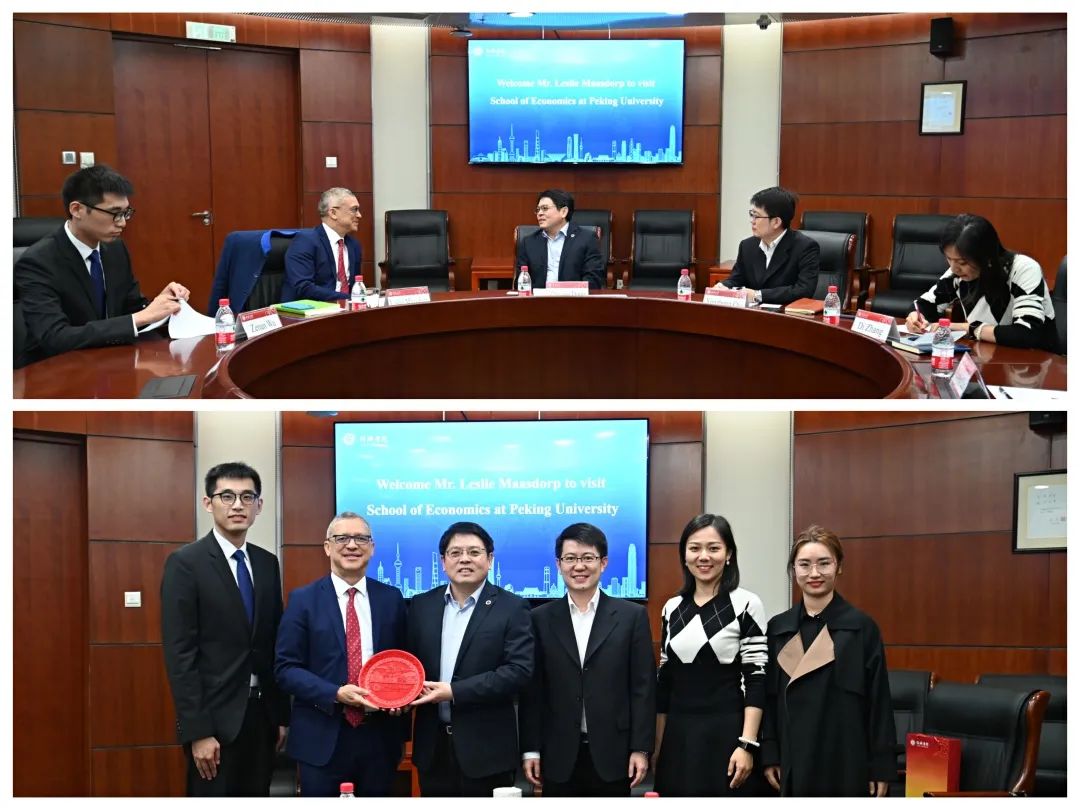
The meeting before the lecture
Subsequently, Leslie Maasdorp gave an academic lecture entitled "The Role of Finance in the Journey to A Low Carbon Future". The lecture was hosted by Qin Xuezheng. He first introduced the development history of development financial institutions, combined with the main challenges faced by human society, and analyzed the important role of development financial institutions in the current society. He pointed out that the market is procyclical. Private commercial banks reduced credit during the economic recession and expanded their business during the economic growth, while development finance plays an important counter-cyclical adjustment role. The world economy is currently undergoing a crisis of transition. Global public issues such as epidemics, climate change, loss of biodiversity, immigration, and refugees cannot be solved by one country. Multilateral organizations are needed to solve the problems faced during the transition.
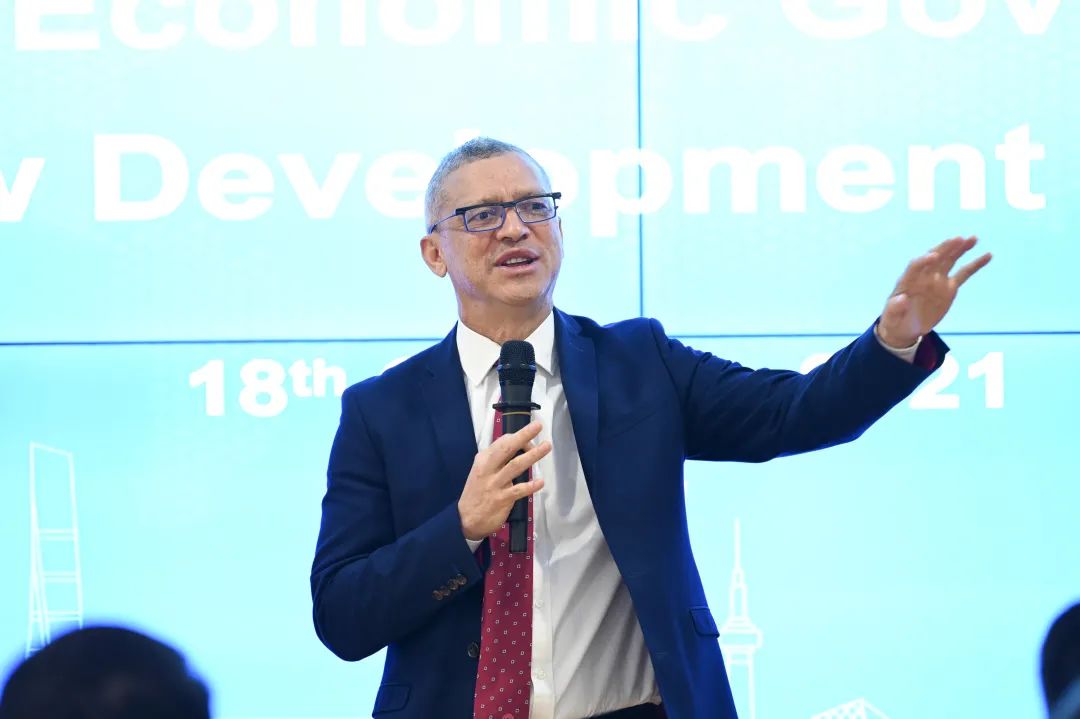
Leslie Maasdorp delivering a speech
Leslie Maasdorp pointed out that the issue of carbon border tax may be one of the major concerns in international relations in the future. When referring to the issue of carbon pricing, he said that who will pay for carbon emissions is still an open question. Carbon emissions involve both production and consumption. He believes that the design of a new green trading system is essential to solve the problem of carbon pricing. This system should treat developing and developed countries fairly, and rationally arrange the collection of carbon taxes between production and consumption links.
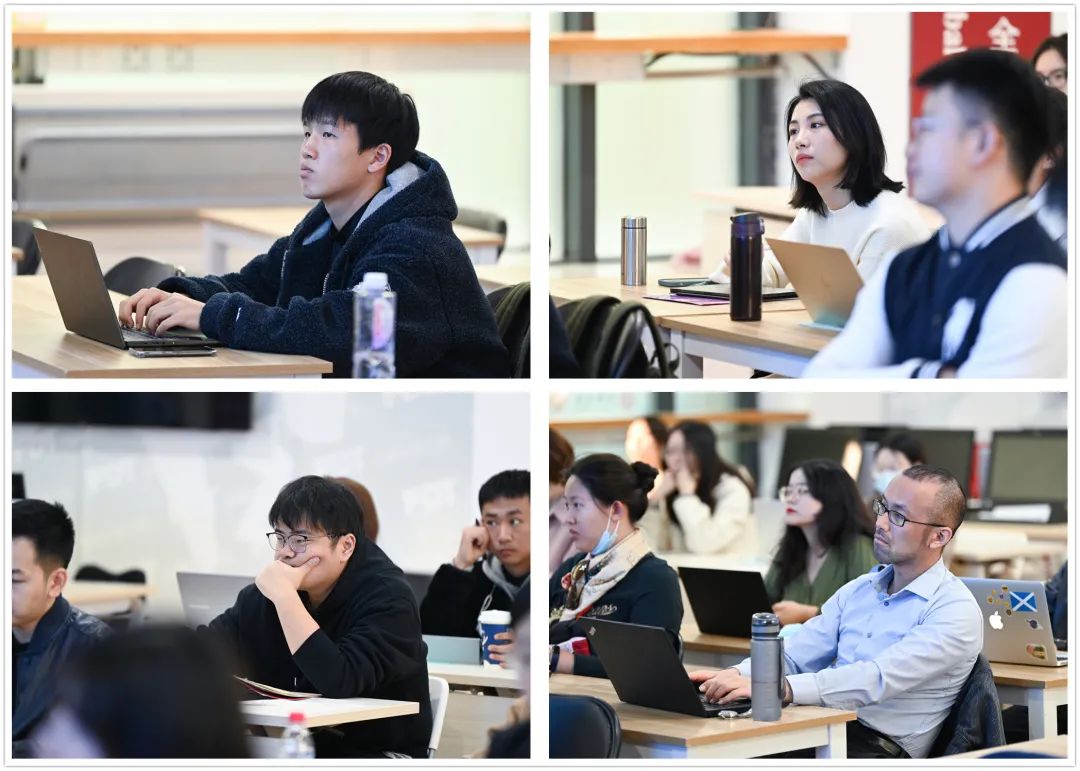
The audience of the lecture
When talking about China, Leslie Maasdorp mentioned that China is a member of the World Bank and the International Monetary Fund, and later joined the Asian Development Bank and the European Bank for Reconstruction and Development. With the establishment of the New Development Bank in China in 2015, China will play a greater role in the global development finance sector. Leslie Maasdorp believes that in the future there will be larger international organizations focusing on emerging markets, and the world of development finance will also undergo tremendous changes.
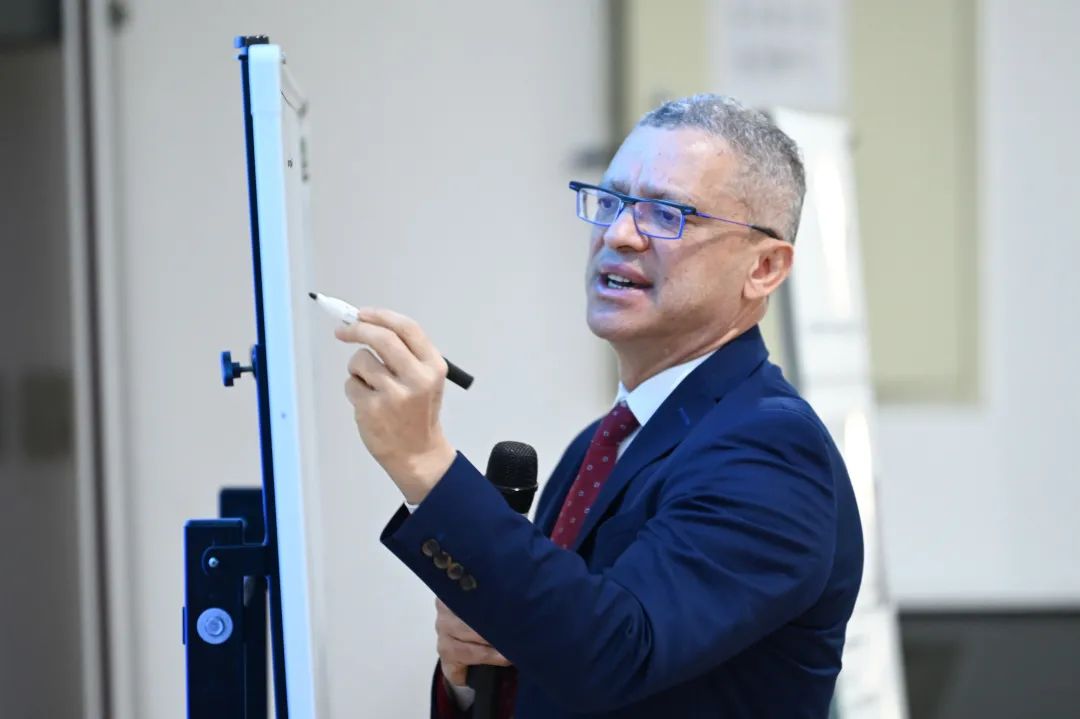
Leslie Maasdorp talking about the Role of Finance in the Low-Carbon Path
When referring to future research directions, Leslie Maasdorp predicted that the climate change crisis is a long-term challenge that humanity will face.
Finally, Leslie Maasdorp put forward relevant suggestions on the reform of development financial institutions on the topic of promoting more efficient operation and more effective function of development financial institutions. He also suggested developing a more dynamic local currency market, deepening the opening of the bond market, and advocated the establishment of unified standards for multilateral banks. He pointed out that the transition to a low-carbon society requires more innovative ideas, and future business models and rules and regulations need to be redesigned.
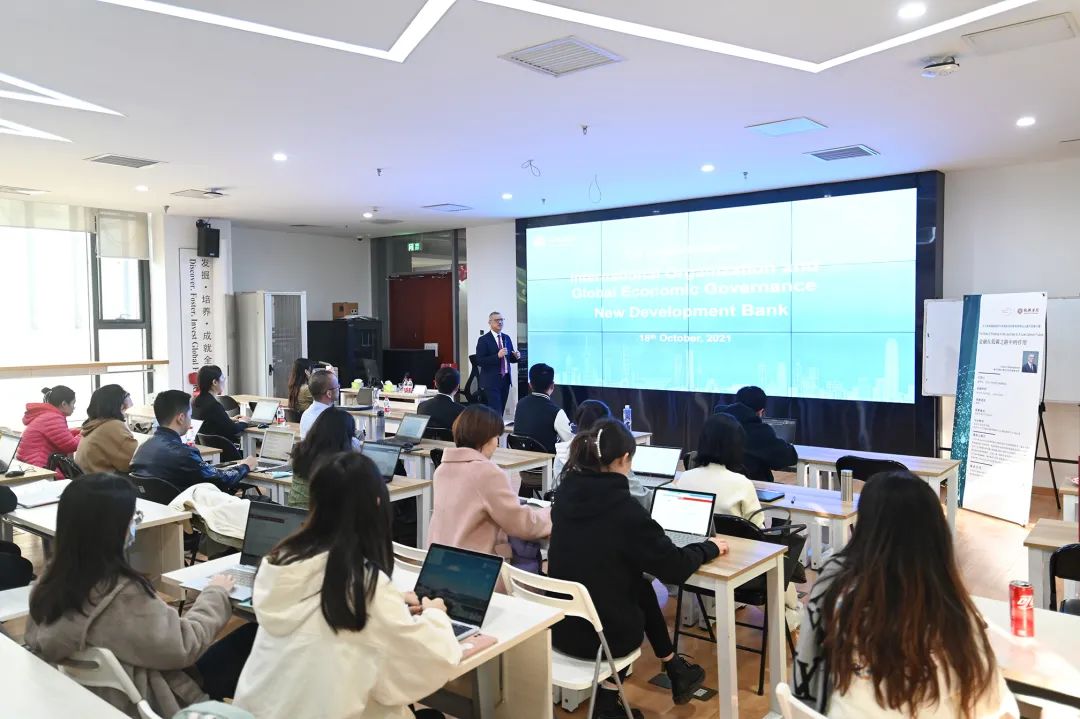
The lecture series
After the lecture, Leslie Maasdorp had an on-site exchange with the students on the spot. He further introduced the funding sources and organizational structure of the New Development Bank, and encouraged students to actively apply for job opportunities in the New Development Bank and other international organizations.
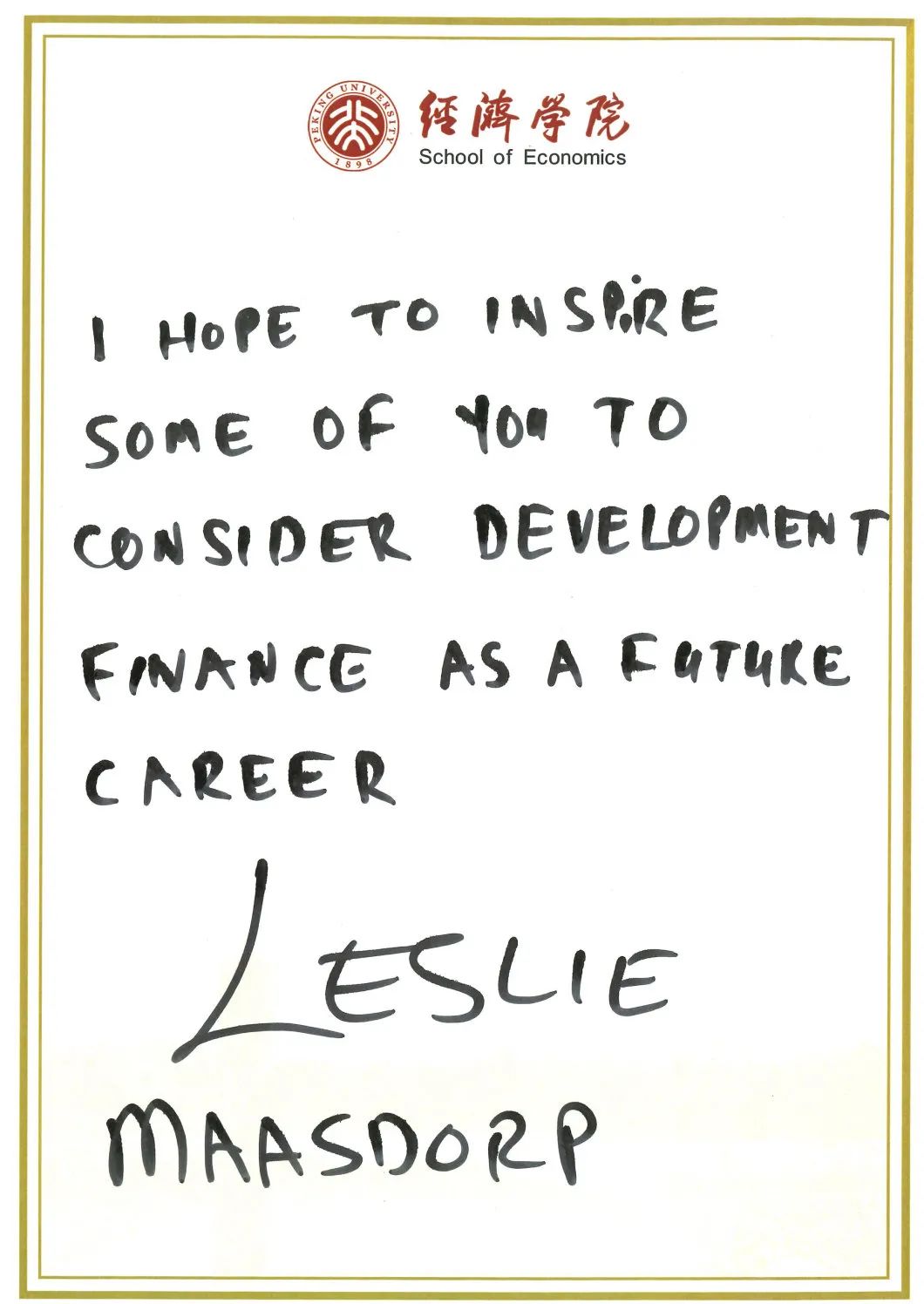
Message from Leslie Maasdorp
Speaker's Profile:
Leslie Maasdorp is currently the Vice President and Chief Financial Officer of the New Development Bank. He has extensive experience in the global investment field. Previous positions include Managing Director and President of Bank of America Merrill Lynch South Africa branch, Vice Chairman of Barclays Capital and CEO of South Africa United Capital Corporation, and the first Goldman Sachs International Consultant appointed in Africa . Prior to this, he held a number of positions in the South African government, including the Special Adviser to the Minister of Labor, the Deputy Director of the Public Enterprise Department of the South African Government, and led the privatization and reorganization of state-owned enterprises. Mr. Leslie Maasdorp is a young global leader of the World Economic Forum.
Introduction on New Development Bank:
The New Development Bank (NDB) is a multilateral development bank jointly established by Brazil, Russia, India, China and South Africa, headquartered in Shanghai, China. The agreement on the establishment of the New Development Bank was signed in July 2014 and came into effect in July 2015. The New Development Bank aims to mobilize resources for infrastructure and sustainable development projects in the BRICS and other emerging economies and developing countries, as a supplement to multilateral and regional financial institutions, and to promote global growth and development. Since its inception, the New Development Bank has approved about 80 projects in member countries with a total loan amount of USD30 billion. The projects cover transportation, water and sanitation, clean energy, digital infrastructure, social infrastructure, and urban development.